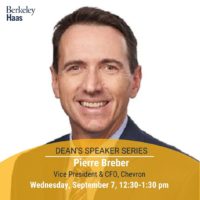Dean Ann Harrison kicked off the first Dean’s Speaker Series talk of the year with a fireside chat with Pierre Breber, Vice President and CFO of Chevron. The talk, co-sponsored by the student-led Berkeley Energy and Resources Collaborative and the Energy Institute at Haas, was also the first in the Sustainable Futures Series, which will welcome business leaders this fall to talk about the role of business in combating climate change.
 “We believe that developing a sustainable, climate-resilient economy goes into every aspect of business—whether it’s agriculture, real estate, energy, finance, anything and everything will need to be reimagined and redesigned to address the current environmental, social, and economic crises,” said Harrison. “We really believe here at Haas that addressing our climate crisis and transitioning to a carbon free energy source is an integral component of the world’s sustainable future.”
“We believe that developing a sustainable, climate-resilient economy goes into every aspect of business—whether it’s agriculture, real estate, energy, finance, anything and everything will need to be reimagined and redesigned to address the current environmental, social, and economic crises,” said Harrison. “We really believe here at Haas that addressing our climate crisis and transitioning to a carbon free energy source is an integral component of the world’s sustainable future.”
Breber, a “double Bear” who earned bachelor’s and master’s degrees from UC Berkeley in 1986 and 1987 along with an MBA from Cornell in 1989, discussed the changes he’s seen over more than 30 years in the energy industry. He talked about Chevron’s ESG strategy, its goal of lowering carbon emissions in its traditional oil and gas business, as well as its investments in renewable fuels, hydrogen, and carbon capture and storage.
“Our primary objective is to safely deliver higher returns and lower carbon,” he said. “It’s clear and simple, and it’s something that our employees have rallied around.”
Breber faced pointed questions from Harrison and students on how an oil and gas company can be part of a sustainable future. He said the company plans to continue its traditional oil and gas business—which holds 2% of the market—with a lower carbon output, while also building its faster-growing new energy business.
“Right now, demand for our products is growing, not shrinking,” Breber said, pointing out that if supplies are cut while demand is still there, heating homes and driving to work will be unaffordable. “It’s an energy transition, it’s not a light switch… We’re going to be a really strong, responsible traditional energy provider, and we intend to be a leading a new energy provider.”
Harrison thanked Breber for volunteering his time to speak at an especially dynamic Dean’s Speaker Series.
“Students, we look forward to a sustainable future. We need to think big,” she told the audience. “Working on the biggest challenges, with the biggest companies, creating the biggest transformations. We need your courage to engage in this kind of transformational change that will save our planet.”